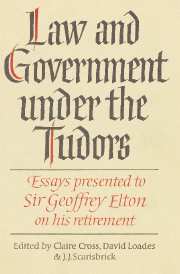Book contents
- Frontmatter
- Contents
- List of contributors
- Preface
- Abbreviations
- Wolsey and the Parliament of 1523
- The Act of Appeals and the English reformation
- Thomas Cromwell and the ‘brethren’
- Henry VIII and the dissolution of the Secular Colleges
- God's law and man's: Stephen Gardiner and the problem of loyalty
- Bondmen under the Tudors
- Wales and England after the Tudor ‘union’: Crown, principality and parliament, 1543–1624
- Robe and sword in the conquest of Ireland
- The principal secretaries in the reign of Edward VI: reflections on their office and archive
- Philip II and the government of England
- Sin and society: the northern high commission and the northern gentry in the reign of Elizabeth I
- The crown, the gentry and London: the enforcement of proclamation, 1596–1640
- Taxation and the political limits of the Tudor state
- Bibliography of the writings of G. R. Elton, 1946–1986
- Index
Taxation and the political limits of the Tudor state
Published online by Cambridge University Press: 06 July 2010
- Frontmatter
- Contents
- List of contributors
- Preface
- Abbreviations
- Wolsey and the Parliament of 1523
- The Act of Appeals and the English reformation
- Thomas Cromwell and the ‘brethren’
- Henry VIII and the dissolution of the Secular Colleges
- God's law and man's: Stephen Gardiner and the problem of loyalty
- Bondmen under the Tudors
- Wales and England after the Tudor ‘union’: Crown, principality and parliament, 1543–1624
- Robe and sword in the conquest of Ireland
- The principal secretaries in the reign of Edward VI: reflections on their office and archive
- Philip II and the government of England
- Sin and society: the northern high commission and the northern gentry in the reign of Elizabeth I
- The crown, the gentry and London: the enforcement of proclamation, 1596–1640
- Taxation and the political limits of the Tudor state
- Bibliography of the writings of G. R. Elton, 1946–1986
- Index
Summary
Taxation occupies a sensitive position in the nexus of constitutional, political, and social relationships, for it is through taxation that economic resources are mobilised for political ends. Societies not only differ in the ends which they deem proper to be attained by taxation, but are also constrained in the kinds of tax they can levy by the nature of their economic resources and by their level of administrative skill. Moreover, since taxes entail compulsion, the ways in which they are authorised and organised are essentially political matters. A study of taxation, therefore, should throw light not only on the social and economic characteristics of a society, but also on its political and administrative structure and its constitutional concepts of obligation and consent.
The Tudor period furnishes a particularly interesting episode in the history of taxation in England for it was under Henry VIII that taxation based on the direct assessment of the wealth of each individual was revived, after having been abandoned as unworkable in the fourteenth century. Direct assessment was to be abandoned again in the mid-seventeenth century after decades of complaint over evasion and under-assessment, and would not be revived again until the very end of the eighteenth century. In the long run, therefore, the Tudor experiment in taxation failed, but an examination of that experiment, and of the timing and causes of its failure, may throw some light on the changing political limits of the Tudor state.
- Type
- Chapter
- Information
- Law and Government under the TudorsEssays Presented to Sir Geoffrey Elton, pp. 227 - 256Publisher: Cambridge University PressPrint publication year: 1988
- 5
- Cited by



